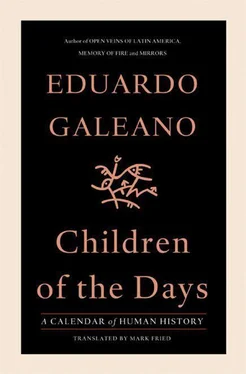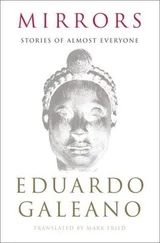On this night the mother goddess of all fish, who came from Africa centuries ago on the slave ships, rises up from the foam of the sea and opens her arms wide. The current brings her combs, brushes, bottles of perfume, cakes, candies and other offerings from sailors dying from love and fear, of her.
Iemanyá’s friends and relatives from the African Olympus usually come along to the party:
Xangô, her son, who unleashes the rains from the heavens;
Oxumaré, the rainbow, guardian of fire;
Ogún, blacksmith and warrior, ruffian and womanizer;
Oshún, the lover who sleeps in the rivers and never erases what she writes;
and Exú, who is Satan of hell and also Jesus of Nazareth.
February 3. CARNIVAL TAKES WING
In 1899 the streets of Rio de Janeiro went wild dancing to the song that launched the history of carioca carnival parades.
That luscious pleasure was called “O abre alas”; the dance was a maxixe, Brazil’s uproarious answer to those stiff ballroom set pieces.
The songwriter was Chiquinha Gonzaga, a composer since childhood.
At the age of sixteen, her parents married her off, and the Marquis of Caxias was godfather at the wedding.
At twenty, her husband insisted she choose between music and family. “I don’t understand life without music,” she said, and off she went.
Her father announced that the family’s honor had been besmirched and he accused Chiquinha of having inherited her flair for sin from some black grandmother. He declared her dead and forbade anyone in his house from mentioning the name of that loose woman.
Her name was Juana Aguilar, but she was called Juana the Long, for the scandalous size of her clitoris.
The Holy Inquisition received several denunciations of that “criminal excess,” and in the year 1803 the Royal Audience of Guatemala sent a surgeon, Narciso Esparragosa, to examine the accused.
This expert in anatomy warned that such a clitoris could be dangerous, as was well known in Egypt and other kingdoms of the Orient, and he found Juana guilty of “flouting the natural order.”
February 5. IN TWO VOICES
They grew up together, the guitar and Violeta Parra.
When one called, the other came.
The guitar and she laughed together, cried together, mused together, believed together.
The guitar had a hole in its breast.
So would she.
On this day in 1967, the guitar called and Violeta did not come.
Then or ever again.
Bob Marley was born poor and slept on the studio floor when he recorded his first songs.
In a few short years he became rich and famous, sleeping on a feather bed, cuddling Miss World, adored far and wide.
But he never forgot that he was more than himself.
Through his voice sang the resonance of times long past, the fiesta and fury of warrior slaves who for two centuries drove their owners crazy in the mountains of Jamaica.
February 7. THE EIGHTH BOLT
Roy Sullivan, a Virginia forest warden, was born on this seventh day in 1912, and during his seventy years he survived seven lightning bolts:
In 1942 lightning tore off a toenail.
In 1969 another bolt singed off his eyebrows and eyelashes.
In 1970 a third charred his left shoulder.
In 1972 a bolt left him bald.
In 1973 another burned his legs.
In 1976 a bolt gashed one ankle.
In 1977 a seventh bolt seared his chest and belly.
But the bolt of lightning that split his skull in 1983 did not come from the heavens.
They say it issued from a woman. A word she said, or didn’t.
They say.
February 8. GENERAL SMOOCH
In 1980 an extraordinary demonstration hit the streets of the Brazilian city of Sorocaba.
Under the military dictatorship, a court had outlawed kisses that undermined public morals. The ruling by Judge Manuel Moralles, which punished such kisses with jail terms, described them this way:
Some kisses are libidinous and therefore obscene, like a kiss on the neck, on the private parts, etc., and like the cinematographic kiss in which the labial mucosa come together in an unsophismable expansion of sensuality.
The city responded by becoming one huge kissodrome. Never had people kissed so much. Prohibition sparked desire and many were those who out of simple curiosity wanted a taste of the unsophismable kiss.
February 9. MARBLE THAT BREATHES
Aphrodite was the first female nude in the history of Greek sculpture.
Praxiteles carved her wearing nothing except a tunic fallen about her feet, and the city of Cos insisted that he clothe her. But another city, Cnidus, offered her a temple. There the most womanly of goddesses, the most goddessly of women, took up residence.
Although she was enclosed and well guarded, people were wild about her and flocked to see her.
On a day like today, fed up with the harassment, Aphrodite fled.
February 10. A VICTORY FOR CIVILIZATION
It happened north of the Uruguay River. The king of Spain bestowed upon his father-in-law, the king of Portugal, seven missions of Jesuit priests. The gift included the thirty thousand Guaraní Indians who lived there.
The Guaranís refused to submit and the Jesuits, accused of conspiring with them, were sent back to Europe.
On this day in 1756, in the hills of Caiboaté, the resistance was defeated.
Victory went to the combined armies of Spain and Portugal, more than four thousand soldiers accompanied by horses, cannon and a large number of land grabbers and slave hunters.
Final score, according to the official statistics:
Indians killed, 1,723.
Spaniards killed, 3.
Portuguese killed, 1.
While the year 1962 was being born, an unknown musical group, two guitars, bass, and drums, auditioned for a record company in London.
The boys returned to Liverpool and sat down to wait.
They counted the hours, they counted the days.
When they had no nails left to bite, on a day like today, they received a response. Decca Recording Company told them frankly, “We don’t like your sound.”
They went further. “Guitar groups are on the way out.”
The Beatles did not commit suicide.
February 12. WORLD BREASTFEEDING DAY
Under the sagging roof of the Chengdu station in Sichuan, hundreds of young Chinese women smile for the camera.
All wear new aprons.
All are freshly washed, combed, groomed.
All have just given birth.
They are waiting for the train that will take them to Beijing.
In Beijing they will breastfeed the babies of others.
These milk cows will be well paid and well fed.
Meanwhile, very far from Beijing, in the villages of Sichuan, their own babies will be fed powdered milk.
They all say they do it for their babies, to pay for their education.
February 13. THE DANGER OF PLAYING
In the year 2008, Miguel López Rocha, who was fooling around on the outskirts of the Mexican city of Guadalajara, slipped and fell into the Santiago River.
Miguel was eight years old.
He did not drown.
He was poisoned.
The river contained arsenic, sulfuric acid, mercury, chromium, lead and furans, dumped into its waters by Aventis, Bayer, Nestlé, IBM, DuPont, Xerox, United Plastics, Celanese, and other companies from countries that prohibit such largesse.
February 14. STOLEN CHILDREN
The sons and daughters of the enemy were war booty during the Argentine military dictatorship, which not so long ago stole more than five hundred children.
Читать дальше












